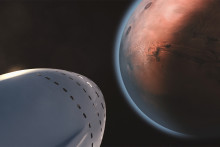In this two-part article, I will critically assess what your chances are to become a Mars colonist with your current study. Only MSc courses are included, so if you are a BSc student and reading this, use it as a guide to make a well-informed decision on your future. Note: the author is not responsible if your choice turns out to be detrimental for your career.
Parental Advisory: the text below may contain obvious sass, ridiculous author bias, and dangerous levels of sarcasm. Viewer discretion is advised.
Applied Mathematics & Applied Physics – 60% chance
Since you basically get to do a lot of math with Applied Physics, these two studies are shamelessly merged. Both studies provide you with a decent chance of getting to Mars but passing the physical tests may be your biggest challenge.
Chemical Engineering – 50% chance
This is a bit of a gamble. Either you become an expert at contamination control and analysing chemical compositions; or you could just learn how to make good meth. I’m not sure which one is more likely to get you a ticket to Mars, since both will probably be in high demand.
Communication Studies – 0% chance
“Houston, we have a problem.”
“Could you please elaborate and say that in a S.M.A.R.T. way?”
“Mayday, mayday. We need help NOW!”
“Are you sure there is an objective problem and that you’re not suffering from confirmation bias or groupthink?”
“Aaahhhh, there’s fire everywhere”
“I’m sorry, I am not sure what your expectancy value is, but I suffer from an extensive knowledge gap, and I need you to increase your elaboration likelihood.”
-connection lost-

Computer Science – 0b10% chance
A computer scientist was sent to Mars. One of the astronauts told him: “Please get me a hammer from outside and, if there are nails, bring back a dozen.” The computer scientist came back with a dozen hammers.
The astronaut wasn’t happy and said: “Go back and while you’re out, pick up some nails.” The computer scientist never came back.
I think you can see why you’re not going to Mars.
European Studies – 0% chance
Hahaha. Good luck with that.
Geographical Information Management and Applications – 0% chance
This is a master’s program where you’re allowed to study at home. Mars won’t allow that. Due to the risk of homesickness, you’ll sadly fail the psychological evaluation at NASA.
Industrial Design Engineering – 30% chance
No one cares that your rocket looks aesthetically pleasing and follows the style of Art Deco when it explodes on the launchpad. Still, you’re in luck, because anything you create or invent on Mars is new and original and hasn’t been done before. Go and reinvent the wheel.
Internet Science & Technology – 80% chance
There is a 2-year MSc in Twente about the internet? Damn it, why didn’t I pick that one.
Since free Wi-Fi is at the top of Maslow’s hierarchy of needs, you’ll be needed in the very first stages of colonization.
Methodology and Statistics for the Behavioural, Biomedical and Social Sciences – 0% chance
If you’re in this study program, you should know that the average amount of time spent looking at a CV is 5-7 seconds. That’s barely enough to read the name of this major, after which your CV will be deposited in the ‘not-going-to-Mars’ box.
Nanotechnology – 0.000000001% chance
While your skills will be vital in developing nanotech swarms, ultra-propelled nanotechnology, nano-sized instruments, and nano-potatoes; these will initially all be developed at Earth. So, unfortunately, your generation will not yet be needed on Mars itself.
Philosophy of Science, Technology and Society – 0% chance
PSTS students have not yet reached consensus on whether Mars exists at all. Several students, per the metaphysical solipsism theory, argue that only one’s own mind is sure to exist, unless one has consumed an excessive amount of alcohol. When I tried to schedule an interview with a PSTS student and asked her when she would have time, she argued that ‘time is an illusion’. I countered that I had given her an a priori notion, to which she told me to ‘go back to my cave’.
As a result, unfortunately no recommendation can be given for a PSTS-student’s chance of going to Mars, at least not until they recognize Mars as an empirically real object.

Psychology – 99.99% chance
Based on a study conducted at the University of Twente (n=8, p=0.05), it was shown that psychology students are by far the most qualified, best equipped and most superior to be a Mars colonist, confirming the null hypothesis. It is unlikely that this study can be replicated, but the same is true of your major in general.
Public Management (part-time) & Risk Management (part-time) – 0% chance
If you’re not willing to commit to a full-time study, then how are you going to survive for a long period of time, possibly a lifetime, on Mars?
Spatial Engineering – 0% chance
Mars is a big, empty desert, without any mega cities, man-made disasters (well, not yet at least) or anything else that your study prepares you for. Come back in about 300 years.
Systems and Control – 90% chance
Good study with the potential to focus on aerospace engineering. Likely one of the best picks out of all masters taught at Twente and you can even take aerospace courses at TUDelft. I don’t really have a joke for this one, unless you consider TUDelft to be a joke.
Technical Medicine – 0% chance
Sorry, since your master’s programme is taught in Dutch and you’re trained to work in Dutch healthcare, you are about as useful on Mars as a homeopathic pharmaceutist.







